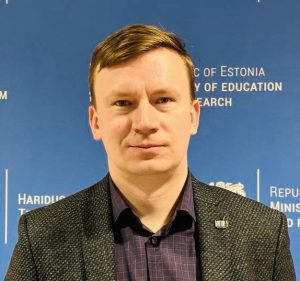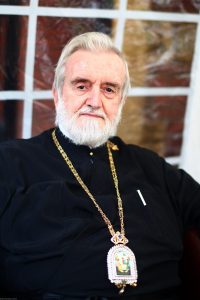
Andrey Shishkov is a research fellow at the School of Theology and Religious Studies of the University of Tartu (Estonia) and a member of the “Orthodoxy as Solidarity” research projects supported by the Estonian Research Council.
On 2 February 2023, John Zizioulas, Orthodox hierarch of the Ecumenical Patriarchate and one of the most influential theologians of the past 50 years, passed away at age 92. He is known worldwide for his theology of communion, described in his two major works: Being as Communion (1985) and Communion and Otherness (2006). These books offer an attempt at a systematic theology that brings together various theological disciplines (such as triadology, Christology, ecclesiology, anthropology, pneumatology, and eschatology) based on the idea that being is communion. His opponents regarded him as a heretic and a modernist, while his supporters considered him one of the greatest minds of the Orthodox Church in history.
Zizioulas’s Influence Inside and Outside the Orthodox Church
Zizioulas was born in 1931 in the village of Katafygio in northern Greece. In the 1950s, he studied at the universities of Thessalonica and Athens. In 1955, he spent one year at the Ecumenical Institute of Bossey. After meeting another prominent ecumenical figure and Orthodox theologian, Archpriest George Florovsky, one of the founders of neopatristic synthesis theology, Zizioulas attempted unsuccessfully to write a dissertation under his supervision at Harvard in the early 1960s. He eventually defended his doctoral thesis in ecclesiology in Athens in 1965. (The revised version was published in 2001.) For more than 15 years Zizioulas taught systematic theology in Scotland, first in Edinburgh and then in Glasgow. During these years, he was involved in ecumenical work for the Faith and Order Commission of the World Council of Churches (WCC).
Zizioulas’s ecclesiastical career began in 1986 when he became the Metropolitan of Pergamon in the Ecumenical Patriarchate. In the same year, he took up the chair of dogmatics at the University of Thessaloniki. After that, no significant theological project in the Orthodox Church was accomplished without Metropolitan John. He led the Orthodox side in bilateral theological dialogues with the Anglican Church (1989–2007) and the Roman Catholic Church (2005–2016). He was chairman of the commission for preparing documents for the Holy and Great Council of the Orthodox Church held in Crete in 2016. In particular, he was the first drafter of the Message and the Encyclical of the Council.
He was also involved in the Orthodox “game of thrones” (ecclesiastical geopolitics), defending the special prerogatives of the Ecumenical Patriarchate for primacy in the Orthodox Church. While emphasizing the cosmopolitanism of the See of Constantinople, Zizioulas struggled with church nationalism. (See his 2013 paper Primacy and Nationalism. [1])

Zizioulas’s influence outside Orthodoxy has been so significant that his theological system has come to be considered almost synonymous with modern Orthodox theology per se. His theology of communion gave new impetus to the Ecumenical movement, which had reached an impasse in its theological explorations in the 1980s. His presentation to the WCC Faith and Order Commission assembly in Santiago de Compostela (Church as Communion, 1993) set forth a new ecumenical understanding of church unity: not static, but dynamic unity in communion (koinonia). Zizioulas’s ideas have been in demand in many theological fields—ecclesiology, theological anthropology, political theology, and theoaesthetics. Not only Orthodox Christians but also Catholics and Protestants have turned to his concepts (for example, William Cavanaugh’s Torture and Eucharist, 1998). Wherever the word koinonia appears in contemporary theological writings, one can be 99 percent sure that a reference to Zizioulas will follow.
The Eucharist Makes the Church
The most famous part of Zizioulas’s theology is his ecclesiology (the study of the Church), which is structured around the thesis that the Eucharist makes the Church. The Eucharistic assembly, led by the bishop, is the expression of the fullness of ecclesiality. Through the Eucharist, every church assembly is united with the eschatological Eucharistic assembly led by Christ himself.
Even during the COVID-19 pandemic, when churches were closed for worship, Zizioulas was adamant, as told to a journalist, “For me, the Church without the holy Eucharist is no longer the Church.” Hierarchical church ministries, such as the bishop, for him also found their foundation in the Eucharist. This latter concept, however, was not without examination. While still a layman, in Being as Communion, he criticized the institution of titular bishops (who have no diocese but only a ministry in the high church office). A year later he became a titular metropolitan.
Tuned Customized Theology
Zizioulas’s theology is like a car customization shop. Existing theological ideas received a significant upgrade and lost their original appearance. At the same time, the modified items shared a unified style and fit into the model line created by the master. He invented them new. It happened, for example, with the Eucharistic ecclesiology of Archpriest Nikolai Afanasiev, who, long before Zizioulas, had invented the principle that the Eucharist makes the Church. But his original theological ideas were consigned to oblivion after Zizioulas’s ingenious revision. The Greek theologian reworked Afanasiev’s old model, replacing its undercarriage and adding cruise control in the form of the doctrine of the bishop as the corporate personality of the church community. As a result, while the design (Eucharist makes the Church) was similar, the whole logic of how the concept works changed. Afanasiev’s model was centered on the assembly of the faithful, and the bishop was only a functional appendage, whereas in Zizioulas’s model, the bishop became the basis of everything, and the community became an impersonal body ruled by him.
Zizioulas greatly influenced Neo-Patristics by adding contemporary philosophy (above all, Emmanuel Levinas and Martin Heidegger), which the neo-patristic mainstream of the time resisted. For Neo-Patristics, there was only ancient philosophy, and modern philosophy was opposed to the very idea of a return to the Fathers of the Church.
He shaped Orthodox theological personalism, which had emerged in the interwar period, by combining anthropology with triadology, Christology, and pneumatology. His doctrine of the human personality has long been a classic of theological anthropology: two hypostases of existence—the biological (in which individuality manifests itself) and the ecclesial (in which personality manifests itself)—are united in the human being. Zizioulas’s theology of personality has become the basis for theological reflection on human rights and a serious alternative to approaches based on the idea of natural law (Jacques Maritain, John Courtney Murray). It has also influenced official Church documents on social issues, such as The Mission of the Orthodox Church in Today’s World (2016) and For the Life of the World: Toward a Social Ethos of the Orthodox Church (2020).
No Place for Imperfection
However, the problem of Zizioulas’s theology is that for all its beauty and rational structure, his system remains hermetic and closed. There is no air of freedom and no room for human individuality. Theologian Miroslav Wolf ironically observed that in Zizioulas’s ecclesiology, members of the community were like clones. The biological hypostasis of existence is insufficient for full existence, and the ecclesiastical hypostasis is inaccessible to nonbelievers.
Metropolitan John thought of human freedom not as freedom of choice but as unanimity—the permanent “Amen!” of the Eucharistic prayer. His theological system was built on an eschatological vision of the Church as a Eucharistic community of saints around Christ, which is ironically reflected in earthly church communities. There was no room for imperfection in this vision and thus no discussion of the abuse of power. With the ecclesiology of Zizioulas, one could easily justify the absolute power of the bishop in the Church, which was dangerous, as the bishop is not Christ (or even a saint).
As a great visionary and inventor, Metropolitan John offered an impressive ideal, but he never told us how to apply it to life.
[1] Metropolitan John Zizioulas of Pergamon, Primacy and Nationalism, 57(3–4) St. Valdimir’s Theological Q. 451 (2013).
